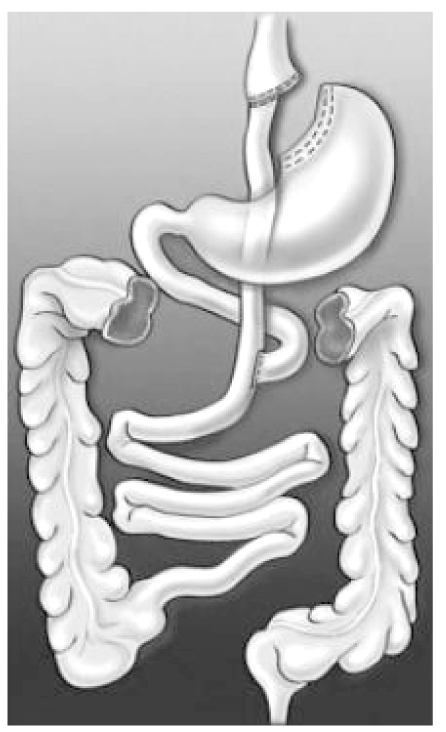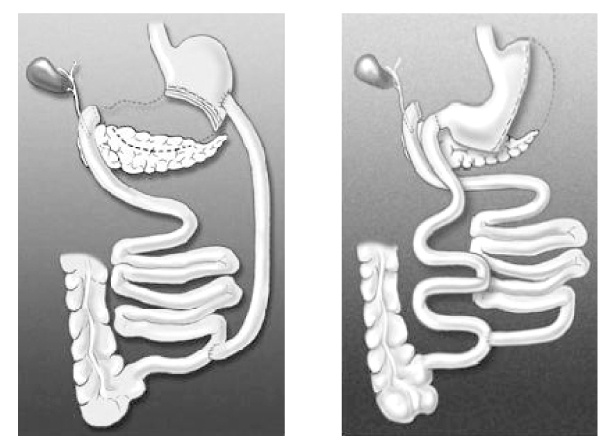J Korean Med Assoc.
2004 Apr;47(4):315-320. 10.5124/jkma.2004.47.4.315.
Bariatric Surgery
- Affiliations
-
- 1Department of General Surgery, Yonsei University College of Medicine, Yong-Dong Severance Hospital, Korea. choish@yumc.yonsei.ac.kr
- KMID: 2183459
- DOI: http://doi.org/10.5124/jkma.2004.47.4.315
Abstract
- Being overweight itself is associated with increased mortality and morbidities from serious diseases. Previous papers have demonstrated a solid line of evidence that nonoperative methods alone have not been effective in achieving a medically significant stable weight loss in severely obese patients. It has been shown that the majority of patients regain all the weight lost over the next five years. Surgical treatment is medically necessary because it is the only proven method of achieving longterm weight control for the morbidly obese individuals. Surgical treatment is not a cosmetic procedure. Morbid obesity correlates with a Body Mass Index (BMI) of 40 kg/m2 or 35 kg/m2 with comobidities such as hypertension, hypertrophic cardiomyopathy, sleep apnea, hypoventilation, glucose intolerance, and diabetes mellitus in western countries. However, in Asian countries including Korea, the indications for surgical treatment of obesity should be reestablished. Surgical methods include gastric restrictive, malabsorptive, and combined. Recently, laparoscopic surgery has been introduced in the field of bariatric surgery.
Keyword
MeSH Terms
Figure
Reference
-
1. Lew EA, Garfinkel L. Variations in mortality by weight among 750,000 men and women. J Chronic Dis. 1979. 32:563–576.
Article2. Stevens J, Cai J, Pamuk ER, Williamson DF, Thun MJ, Wood JL. The effect of age on the association between body-mass index and mortality. N Engl J Med. 1998. 338:1–7.
Article3. Drenick EJ, Bale GS, Seltzer F, Johnson DG. Excessive mortality and causes of death in morbidly obese men. JAMA. 1980. 243:443–445.
Article4. Hubert HB, Feinleib M, McNamara PM, Castelli WP. Obesity as an independent risk factor for cardiovascular disease: a 26-year follow-up of participants in the Framingham Heart Study. Circulation. 1983. 67:968–977.
Article5. Health Implications. NIH Consensus Development Conference Statement. Ann Int Med. 1985. 103:1073–1077.6. National Task Force on the Prevention and Treatment of Obesity. National Institutes of Health. Very low-calorie diets. JAMA. 1993. 270:967–974.7. Safer DJ. Diet, behaviour modification and exercise. A review of obesity treatments from a long term perspective. South Med J. 1991. 84:1470–1470.8. Weintraub M, Sundaresan PR, Schuster B, Averbuch M, Stein EC, Byrne L, et al. Long-term weight control study. IV (weeks 156 to 190). The second double-blind phase. Clin Pharmacol Ther. 1992. 51:608–614.9. Powers PS. Deitel M, editor. Conservative treatments for morbid obesity. Surgery for the morbidly obese patient. 1989. Philadelphia: Lea & Febiger;27–37.10. Herron DM. Related Articles, The surgical management of severe obesity. Mt Sinai J Med. 2004. 71:63–71.11. Fobi MA. Related Articles, Surgical treatment of obesity: a review. J Natl Med Assoc. 2004. 96:61–75.12. Kanaya AM, Narayan KM. Prevention of type 2 diabetes: data from recent trials. Prim Care. 2003. 30:511–526.
Article13. Herpertz S, Kielmann R, Wolf AM, Langkafel M, Senf W, Hebebrand J. Does obesity surgery improve psychosocial functioning? A systematic review. Int J Obes Relat Metab Disord. 2003. 27:1300–1314.
Article14. Fang J. The cost-effectiveness of bariatric surgery. Am J Gastroenterol. 2003. 98:2097–2098.15. Rand CS, Macgregor AM, Hankins GC. Eating behavior after gastric bypass surgery for obesity. South Med J. 1987. 80:961–964.
Article16. Mason EE, Ito C. Gastric bypass in obesity. Surg Clin North Am. 1967. 47:1345–1351.
Article17. Wittgrove AC, Clark GW, Tremblay LJ. Laparoscopic Gastric Bypass, Roux-en-Y: Preliminary Report of Five Cases. Obes Surg. 1994. 4:353–357.
Article18. Vallis JM, Ross MA. The role of psychological factors in bariatric surgery for morbid obesity: Identification of psychological predictors of success. Obes Surg. 1993. 4:346–359.
Article19. Pories WJ, Dolezal JM, et al. Who would have thought it? An operation proves to be the most effective therapy for adult-onset diabetes mellitus. Ann Surg. 1995. 222:339–350.
Article20. Sugerman HJ, Sawyer MJ, et al. Gastric bypass for treating severe obesity. Am J Clin Nutr. 1992. 55:2 Suppl. 560S–566S.
Article21. Linner JH, Drew RW. Why the Operation We Prefer is the Roux-Y Gastric Bypass. Obes Surg. 1991. 1:305–306.
Article22. Mason EE. Gastric surgery for morbid obesity. Surg Clin North Am. 1992. 72:501–513.
Article23. Yale CE. Gastric surgery for morbid obesity. Complications and long-term weight control. Arch Surg. 1989. 124:941–944.24. MacLean LD, Rhode BM, Forse RA. Late results of vertical banded gastroplasty for morbid and super obesity. Surgery. 1990. 107:20–27.25. Charuzi I, Lavie P, Peiser J, Peled R, et al. Bariatric surgery in morbidly obese sleep-apnea patients: short- and long-term follow-up. Am J Clin Nutr. 1992. 55:2 Suppl. 594S–596S.
Article26. Benotti PN, Bistrain B, Benotti JR, Blackburn G, Forse RA. Heart disease and hypertension in severe obesity: the benefits of weight reduction. Am J Clin Nutr. 1992. 55:2 Suppl. 586S–590S.
Article27. MacDonald KG Jr, Pories WJ, et al. The Gastric Bypass Operation Reduces the Progression and Mortality of Non-Insulin-Dependent Diabetes Mellitus. J Gastrointest Surg. 1997. 1:213–220.
Article28. Kral JG, Sjöström LV, Sullivan MB. Assessment of quality of life before and after surgery for severe obesity. Am J Clin Nutr. 1992. 55:2 Suppl. 611S–614S.
Article29. Rand CS, Macgregor A, Hankins G. Gastric bypass surgery for obesity: weight loss, psychosocial outcome, and morbidity one and three years later. South Med J. 1986. 79:1511–1514.30. Rand CS, Macgregor AM. Medical care and pregnancy outcome after gastric bypass surgery for obesity. South Med J. 1989. 82(10):1319–1320.
Article31. Wittvogove AC, Jester L, Wittgrove P, Clark GW. Pregnancy following gastric bypass for morbid obesity. Obes Surg. 1998. 8:461–464.
Article




